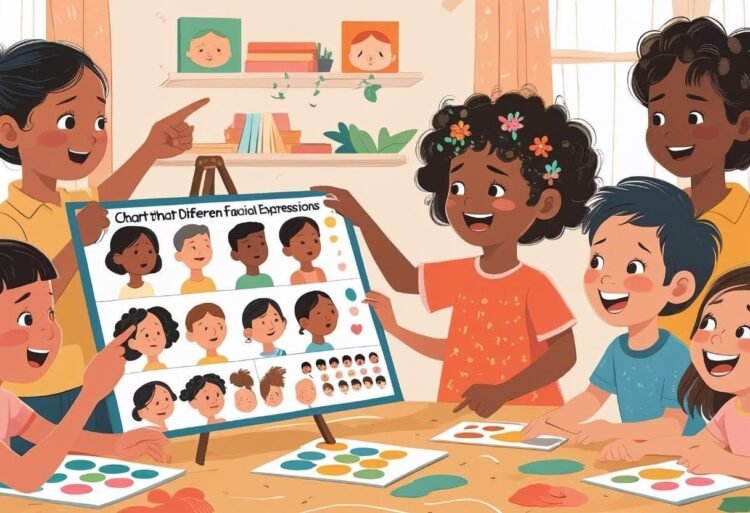Why Child Emotions Deserve Attention
Child emotions are powerful and often overwhelming. From joy to jealousy, pride to fear, children feel the full spectrum of emotions but often lack the words to express them. Without support, these emotions can show up as tantrums, withdrawal, or challenging behaviours.
Helping children to recognise, name, and regulate their emotions builds the foundation for resilience, empathy, and long-term mental wellbeing.
The Science of Child Emotions and the Brain
Emotions are deeply connected to brain development:
-
Amygdala: Detects threats and activates “fight, flight, or freeze” responses. This is why children may react strongly to small frustrations.
-
Prefrontal Cortex: Helps regulate emotions and plan responses. Since it isn’t fully developed until the mid-20s, children often need guidance to calm down and understand their feelings.
-
Neuroplasticity: The brain’s ability to rewire itself. The more children practice naming and managing emotions, the stronger their regulation pathways become.
This explains why daily emotional literacy practice creates long-lasting benefits.
Why Naming Child Emotions Matters
Research in affective neuroscience shows that labeling emotions reduces their intensity by shifting brain activity away from the amygdala and toward the language-based areas of the brain.
For children, simply saying, “I feel nervous” or “I feel proud” makes the feeling more manageable.
Naming child emotions also:
-
Validates their experiences (“It makes sense you feel nervous before school”).
-
Encourages empathy as they recognise emotions in others.
-
Prevents suppression, which has been linked to increased stress and anxiety.
5 Strategies to Support Child Emotions and Emotional Literacy
1. Use Visual Tools for Child Emotions
Children learn visually. Illustrated books such as How Do I Feel? A Dictionary of Emotions for Children provide simple definitions and relatable images that bring emotions to life.
2. Connect Child Emotions to the Body
Science shows emotions create physical reactions — fear quickens the heartbeat, anger tightens muscles, sadness feels heavy in the chest. Asking children, “Where do you feel this in your body?” strengthens self-awareness and regulation.
3. Model Emotional Language to Support Child Emotions
Children copy adult behaviour. When parents or teachers say, “I feel frustrated that traffic was slow, but I’m calming down now”, kids learn that emotions can be expressed safely and managed constructively.
4. Validate, Don’t Dismiss Child Emotions
Psychological research confirms that dismissing emotions (“Don’t cry, it’s nothing”) increases stress and erodes trust. Validation (“I see you’re sad — that must feel heavy”) builds emotional security and helps children feel understood.
5. Create Daily Emotional Check-Ins for Kids
Routine is powerful. A daily check-in using an emotion wheel, flashcards, or colour chart shows kids that feelings are normal and ever-changing. Over time, this strengthens neural pathways for reflection and self-regulation.
Helpful Tools for Supporting Child Emotions
How Do I Feel? (Book)
This beautifully illustrated book introduces over 60 child emotions with simple definitions and vivid metaphors. Designed to help kids recognise and name their feelings, it’s a perfect tool for families and schools building emotional literacy. By linking words with images, it supports healthy brain pathways for self-awareness. 👉 Shop on Amazon AU
Montessori Emotion Cards
These Montessori-inspired cards use playful animal illustrations to reflect common child emotions like pride, worry, and joy. Each card encourages recognition and reflection, making abstract feelings easier to grasp. Ideal for children aged 3+, they spark meaningful conversations while strengthening emotional vocabulary through imagery. 👉 Shop on Amazon AU
Learnworx Feeling Cards
A practical set of 60 cards designed for early years learning. Each card links child emotions to real-life scenarios — like feeling afraid of a spider — helping kids connect feelings with experiences. Durable and wipe-clean, they’re perfect for everyday use at home, preschool, or therapy sessions. 👉 Shop on Amazon AU
Photo-Based Flash Cards
Featuring real children’s facial expressions, these flashcards help build empathy and recognition skills. They are especially effective in linking child emotions to social cues, making them useful in classrooms, speech therapy, or group play. Kids learn not just to name emotions, but to see them in others. 👉 Shop on Amazon AU
Conscious Kids Emotion Cards
This 50-card deck combines emotions with open-ended prompts, encouraging children to reflect and share their feelings. Backed by child development strategies, it creates opportunities for dialogue and self-expression in group or family settings. A flexible tool for teaching emotional literacy in a fun, interactive way. 👉 Shop on Amazon AU
When Big Child Emotions Feel Overwhelming
Big emotions are a normal part of development. Emotional “meltdowns” happen when the amygdala takes over before the prefrontal cortex can respond. With consistent support, children learn to pause, name and regulate their feelings. Repetition strengthens the brain’s resilience pathways.
Final Thoughts on Child Emotions and Literacy
Emotional literacy is not about suppressing “bad” feelings it’s about recognising the full spectrum of child emotions. By giving kids the tools to name and reflect on their feelings, we equip them with skills for resilience, empathy, and wellbeing.
Science shows that even simple daily practices — like naming one emotion at bedtime or using flashcards during morning routines — can literally rewire a child’s brain for healthier emotional regulation.
Call to Action:
Bring emotional science into everyday life. Explore evidence-based tools like How Do I Feel? and emotion flashcards to make conversations about child emotions natural and empowering at home and in schools.

For more in-depth, science-backed insights on child health, emotional wellbeing, and evidence-based care, explore the rich library of thought leadership on the Meducate blog. From functional foods and sleep science to trauma-informed healing and mental burnout, there’s a wealth of expert-written articles to support both practitioners and families. Dive into topics like:
- Functional Foods: 7 Science-Backed Benefits for Better Health
- Healthy Eating for Kids: 8 Fun, Science-Backed Tips That Actually Work
- 7 Signs You’re Experiencing Mental Burnout Right Now
Visit now Meducate Blog

Explore Meducate Wellness on Pinterest for evidence-based tips and feel-good ideas,from healthy recipes and self-care strategies to parenting wisdom and emotional tools for kids. Highlights include:
- Science-backed bite-sized wellness routines
- Healthy Happy Kids: Backed by Science board with educational tips and book recommendations
- Calming rituals like lullabies and mindful bedtime guides
Visit now Meducate Welness on Pinterest

Check out the MedHeads YouTube Channel for expert conversations, science-backed insights, and practical health education. From emotional wellbeing and mental health to everyday lifestyle strategies, MedHeads makes complex topics accessible and engaging.
- Practitioner-led discussions on emotional literacy and wellbeing
- Science explained in simple, actionable terms
- New episodes every week
Subscribe now: MedHeads on YouTube
Affiliate Disclaimer
This article contains affiliate links. If you purchase a product through these links, Meducate may earn a small commission at no additional cost to you. We only recommend products that are evidence-based and aligned with our mission to support child wellbeing.


























